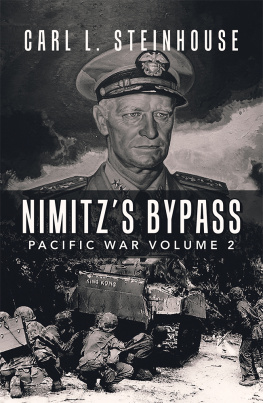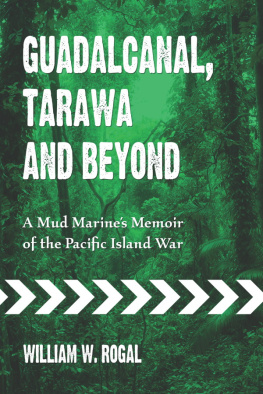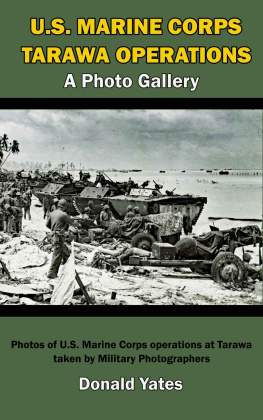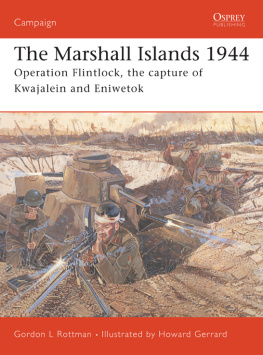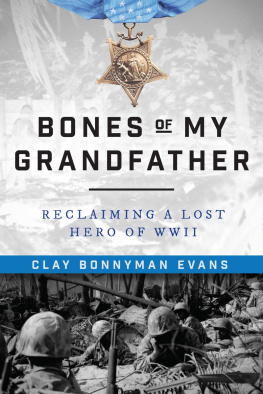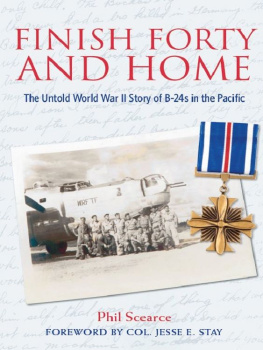UTMOST SAVAGERY
It was a time of utmost savagery.
I still dont know how they took the place.
Kerr Eby
Tarawa, November 1943


The latest edition of this work has been brought to publication with the generous assistance of Edward S. and Joyce I. Miller.
Naval Institute Press
291 Wood Road
Annapolis, MD 21402
1995 by Joseph H. Alexander
All rights reserved. No part of this book may be reproduced or transmitted in any form or by any means electronic or mechanical including photocopying, reprinting, or on any information storage or retrieval system, without permission in writing from the publisher.
First Naval Institute Press paperback edition published 2008
ISBN 978-1-61251-167-2 (eBook)
The Library of Congress has cataloged the hardcover edition as follows:
Alexander, Joseph H., 1938
Utmost savagery : the three days of Tarawa / Joseph H. Alexander.
p. cm.
Includes bibliographical references and index.
1. Tarawa, Battle of, 1943. 2. United States. Marine CorpsHistoryWorld War, 19391945. 3. Tarawa (Kiribati)History, Military. I. Title.
D767.917.A48 1995
940.5426dc20
95-15534

 Print editions meet the requirements of ANSI/NISO z39.48-1992 (Permanence of Paper).
Print editions meet the requirements of ANSI/NISO z39.48-1992 (Permanence of Paper).
14 13 12 11 10
Maps by Mary Craddock Hoffman
Frontispiece: The Seawall at Tarawa by artistand retired Marine colonelCharles H. Waterhouse. (Courtesy of artist)
To Gale, and to the men of the 2d Marine Division and the Southern Attack Force at Tarawa
ERRATA
1. Page 53, line 38: should read covers.
2. Page 105, line 14: should read flanking.
3. Page 120, line 4: , should read 1st Lieutenant Samuel C. Turner, the executive officer.
4. Page 121, line 17: should read Turner.
5. Page 127, line 16: should read Tanambogo.
6. Page 131, line 2: after insert Company K commander Capt. J. Wendell.
7. Page 148, line 25: should read mounts.
8. Page 199, line 22: should read Hall.
9. Page 224, line 20: should read U.K.
10. Page 276, line 39: should read Hall.
11. Page 287, line 40: should read Hall.
12. Page 295, column 1, line 4: should read Crain, J. Wendell, 131, 152, 169, 17071.
13. Page 296, column 1, line 9: should read Hall.
14. Page 302, column 2, line 36: should read Turner, Samuel C., 12021, 152, 169.
Contents
Illustrations
Photographs
Chart
Maps
AMONG THE LONG LIST OF U.S. MARINE CORPS BATTLES, TARAWA has a special resonance. Even to those who know very little of Marine Corps history, it evokes images of a small sandy island in a coral atoll somewhere in the Central Pacific; amphibian tractors grinding their way across a barrier reef; dead Marines floating face down in the surf; an incredible maze of fortifications of concrete and coconut logs; a Japanese enemy absolutely determined to fight to the death; and three days of soul-searing, flesh-rending, unabated violence.
Col. Joseph Hammond Alexander, USMC (Ret.), has caught all of that and more in Utmost Savagery: The Three Days of Tarawa.
Fifty years after the battle, Tarawa needed to be reexamined. This is quite probably the most significant bookand there have been a good number of books, some fine, some not so fineon Tarawa since Robert Sherrod wrote Tarawa: The Story of a Battle. Published in 1944 and kept in print ever since, Sherrods classic gave an immediate and unsurpassed picture of the battle by a journalist-historian who was there.
Colonel Alexander was not there, but he has seen violent combat in a different sort of war, Vietnam, and eleven of his twenty-nine years of active service were spent in amphibian tractor battalions, in amphibian tractors that were direct descendants, improved but not greatly changed, of those tractors that crossed the reef at Tarawa.
Born in Charlotte, North Carolina, Joe Alexander has lived a peripatetic life. He has counted up thirty-eight moves: nineteen growing up (his father worked for AT&T) and nineteen during his Marine Corps service. Joe was commissioned by way of the Naval Reserve Officers Training Corps in 1960. His bachelors degree from the University of North Carolina was in history; he has since earned a master of arts degree in history from Jacksonville University and a masters in national security studies from Georgetown University.
Joe had two tours in Vietnam. The first began in 1964, when he was the combat cargo officer in the assault transport USS Lenawee (APA 195). He took part in the initial landings at Hue, Danang, and Chu Lai. His second tour, in 1969, was spent as a company commander in the 3d Amphibian Tractor Battalion.
In 1980 and 1981 Joe attended the Naval War College, emerging as a distinguished graduate. Later, as a colonel, he served as chief of staff, 3d Marine Division, on Okinawa; director of the Marine Corps Development Center at Quantico; chief of the Strategic Mobility Branch at Headquarters, U.S. Marine Corps; and military secretary to Gen. Paul X. Kelley, 28th commandant of the Marine Corps.
Since his retirement from active service in 1988, Joe has made himself increasingly known as a military historian. Naval Institute Press published his Sea Soldiers in the Cold War, coauthored with Lt. Col. Merrill L. Bartlett, USMC (Ret.), in 1994. Joes articles, which primarily concentrate on the various campaigns in the Pacific in World War II, have appeared in the U.S. Naval Institute Proceedings, Naval History, Marine Corps Gazette, Leatherneck, World War II, and like journals and magazines. Much in demand as a lecturer, he has served as a researcher, writer, and on-screen historian for six television documentaries on the Pacific War.
Utmost Savagery, superbly written and underlain with meticulous scholarship and research, establishes Colonel Alexander as the preeminent living authority on Tarawa. Significantly, the late Robert Sherrod is one of those who encouraged Joe to write this book. If Bob Sherrod had lived to see the finished product, he undoubtedly would have been well pleased.
Next page

